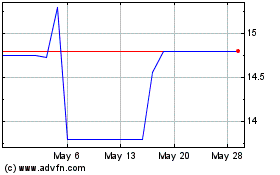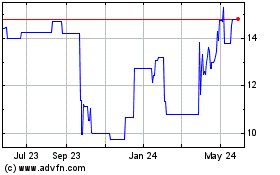UK Energy Regulator Ofgem Outlines Decarbonization Plan
February 03 2020 - 6:39AM
Dow Jones News
By Dieter Holger
The U.K.'s Office of Gas and Electricity Markets laid out a
wide-ranging, nine-point plan on Monday to ensure energy networks
can affordably power the country under Britain's target of net zero
carbon-dioxide emissions by 2050.
The U.K. has already made progress toward its 2050 ambition.
Ofgem said emissions have fallen 40% from 1990 levels with almost
half of electricity coming from renewable or low-carbon sources
last year.
"Britain has come a long way. It has decarbonized faster than
any other major economy, but we must go further, particularly on
heat and transport," said Jonathan Brearley, chief executive of
Ofgem, in prepared remarks.
The regulator said it expects consumers to be hit with extra
costs in the short term under the plan, but that "investing in the
short term will save money in the medium and long term" and
ultimately save consumers "billions of pounds on their energy
bills."
"Where the costs of this are met through consumer bills, this
will be generally regressive, impacting the poorest hardest," Ofgem
said.
Investment in the power sector may need to increase to around 20
billion pounds ($26.4 billion) a year until 2050, up from an
average of GBP10 billion between 2013 and 2017, according to the
Committee on Climate Change.
In the next 18 months, Ofgem said it will create the next series
of price controls to set power company spending over the next five
years, encouraging investment in infrastructure, including
upgrading the grid so it can power 10 million electric vehicles by
2030 and developing an offshore grid to quadruple wind generation
by 2030.
"As low-carbon renewable energy grows and more transport goes
electric, the energy system needs to be more flexible to respond to
peaks and troughs in both supply and demand," Mr. Brearley said.
"Our new price controls for network companies will clear the path
for this."
Ofgem said the next price-control periods run from 2021 to 2026
for gas distribution and electric-and-gas transmission, and from
2023 to 2028 for electricity distribution.
Another challenge is cutting energy that heats buildings. Ofgem
said "the best way forward is not yet clear" but could involve
hydrogen networks and electric heating. In 2017, only 4.5% of the
energy used to heat the U.K.'s 29 million homes came from a
low-carbon source, the regulator said. Switching to low-carbon
heating will require a yearly investment of up to GBP20 billion
until 2050, according to the CCC.
Ofgem also said it was reviewing how energy systems are managed
to meet net-zero emissions at the least cost, and the role of the
current electricity system operator National Grid PLC (NG.LN).
National Grid's U.K. Executive Director Nicola Shaw said in an
email that the company welcomed Ofgem's plan and was committed to
the net zero target, pledging to cut emissions from heating homes
while supporting the growth of renewables and electric
vehicles.
"It's critical that the regulator, government and industry are
aligned to decarbonize the energy sector in the journey to net zero
at the lowest cost to consumers," she said.
Will Gardiner, chief executive of British power company Drax
Group PLC (DRX.LN), also welcomed the decarbonization plan. Drax
provides around 12% of the U.K.'s renewable electricity and has a
goal of reaching carbon negativity by 2030.
"Alongside investment in the network, the U.K. will need to see
support for new sources of flexible generation and system stability
as more offshore wind is deployed and the heat and transport
sectors become more dependent on electricity," Mr. Gardiner said in
an email.
Write to Dieter Holger at dieter.holger@wsj.com;
@dieterholger
(END) Dow Jones Newswires
February 03, 2020 06:24 ET (11:24 GMT)
Copyright (c) 2020 Dow Jones & Company, Inc.
Drax (PK) (USOTC:DRXGY)
Historical Stock Chart
From Feb 2025 to Mar 2025

Drax (PK) (USOTC:DRXGY)
Historical Stock Chart
From Mar 2024 to Mar 2025
